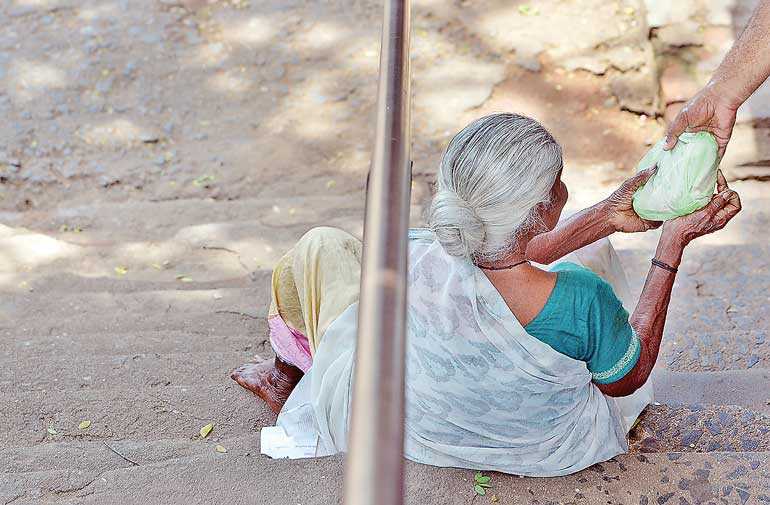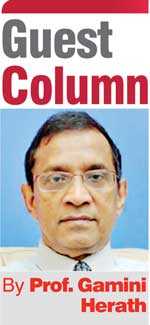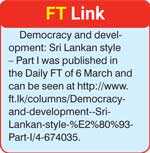Friday Feb 13, 2026
Friday Feb 13, 2026
Thursday, 7 March 2019 00:00 - - {{hitsCtrl.values.hits}}

Large Cabinet of Ministers
The Government is keen to expand the Cabinet to accommodate those who shifted allegiance to the new Government. Do we need more of the above people? Certainly not. An increase in the size of the Cabinet is totally unnecessary and could only lead to the diminution or abandonment of collective responsibility. Many ministers are not conversant with the complexities of the full range of public policy in the country. More ministers can trespass without authorisation on the departmental responsibilities of other ministers or areas with no responsibility, leading to conflicts.
Look at the conflicts between Sarath Fonseka, Palitha Thewarapperuma, Wijeyadasa Rajapakshe, Ranga Bandara, and many others. More ministers mean more of these conflicts which Sri Lanka can ill afford. In 2018, thirteen members of Parliament, which include former ministers Janaka Bandara Tennekoon, Arumugam Thondaman and some others never spoke a word in Parliament. Wasantha Senanayake, a descendent of the Senanayake family, attended Parliament only for six days in 2018. Do we need any more of these nincompoops in the Cabinet or the Parliament, and for what purpose? We are sacrificing the advantages of having a small but effective Cabinet before the altar of political expediency.

Think of a large Cabinet in the context of the expensive cars for politicians. Nagananda Kodituwakku proved that parliamentarians defrauded at least Rs. 7 billion in tax revenue by selling tax-free car permits. There is justifiable anger over such abuses of perks by Members of Parliament who argue that they need cars to travel to their constituencies to serve them more efficiently. But why do they then sell their cars?
Parliamentarians have borrowed power from the poor and must forgo these unnecessary luxuries. The President, Prime Minister, ministers and other legislators must implement the necessary priorities against expensive cars when Sri Lankans are grappling with poverty. They are milking a very thin cow. Nearly 90% of the bars in Sri Lanka are owned by parliamentarians while preaching sermons on the virtues of the ‘Mathata Thitha’. Cocaine also appears to be on the menu.
If we buy one less car for politicians, we can build 100 toilets for school children. We have totally misplaced praise for our leaders and little has changed, some issues have worsened and we have failed to change the attitudes, consciousness and psyche of our people, all of which is imperative before any election. President Sirisena limited Cabinet Ministers to 30, which is good but it should be lower, perhaps about 23.
Bureaucratic malfeasance, poor governance and policy failure
The Yahapalana Government made some good progress in addressing problems such smoking, drug pricing, independence of the Judiciary and the press and raising environmental consciousness. But these successes cannot obscure the cascade of policy failures in ending poverty and hunger, reducing income inequality and ending corruption, water scarcity and climate change. In a new global index, Sri Lanka has been ranked second among the countries most affected by extreme weather events in 2017. The Long-Term Climate Risk Index listed Puerto Rico and Sri Lanka as the top two affected countries. Poor understanding of critical issues such as poverty, climate change and inequality are at the heart of the problem. Our politicians do not know the difference between weather and climate change.
Sri Lanka needs top bureaucrats, academics and other skilled and efficient personnel to meet the needs of a fast-developing world. Appointments to high office is not necessarily based on expertise, capabilities and performance. Politicians have gradually emasculated the bureaucracy through political favouritism, continual changes, and low wages. The fawningly sychophantic bureaucracy is weak and major reforms in bureaucracy and civil service are needed for rapid progress. Many bureaucrats attempt to have smooth relations with politicians because their survival depends on closeness to politicians and not to their work potential.
Politicians have taken control of policy-making from the hands of bureaucrats, academics and other elites through improper appointments to strategic positions in ministries, agencies, universities and think tanks. Excellent people are alienated from the policy process. This is extremely unproductive and prevent policies from being bound by the interests of people and society, as well as critical analysis. Many leaders in academia, professions, and bureaucracy have left the shores for greener pastures.
Politicians must work with competent bureaucrats in formulating key policy initiatives to improve the policy-making capabilities of legislators. The Government must engage the public and experts in the policy-making process to identify problems, discover new thinking and propose solutions. Leadership involves effective strategic thinking, choosing between different arguments, reconciling conflicting opinions and arbitrating between different groups and interests.
Open and contested policy-making can deliver genuine public engagement which will help policy-makers to get away from listening only to the media and the lobbyists. Digital technology and new media have a huge role to play. In time, the Government should be able to demonstrate that the citizen is able to contribute opinion, ideas and suggestions on an ongoing basis, if it is to be seen as moving away from old processes and embracing a new relationship with the citizen.
In countries like Japan, Korea, the UK and Australia, a harmonious relations exist among bureaucrats, politicians and industry. To provide robust policy advice and for a dynamic world with major changes in technology and development paradigms, we must foster the research capacity of universities, research institutes and think tanks. The universities and research institutes can be be tapped to provide ideas in formulating legislation.

In the UK, the budget for policy studies is allocated to the Opposition as well as ruling parties. In South Korea, 30% of subsidies to political parties must be spent on policy studies. Sri Lanka must deepen research capabilities and innovation capacity, through the provision of skills and university-industry linkages. The present research activities of universities are too limited, diffused and underfunded to lead to significant innovations.
The Centre for Dengue Research of the University of Sri Jayewardenepura, led by Professor Neelika Malavge, has been halted as the National Science Foundation was unable to provide them required funds for this year due to financial constraints placed on them by the Treasury. This is despite dengue being one of the major health issues in the country for decades. In 2018, Sri Lanka reported 50,163 dengue cases and 56 deaths, the highest number of dengue cases, 10,051 being from the Colombo district, and the second highest of 5604 from the Gampaha district. Think of the cost that could be avoided if we can control this mosquito.
Sri Lankan voters
The collapse of democracy is orchestrated by elected governments. Elected extremist demagogues and authoritarian assassins use the very institution of democracy to gradually kill it. They somehow maintain a veneer of democracy while eviscerating it of all basic principles of the democratic process. Voters must prevent such leaders from gaining power by refusing to endorse or align with them. Sri Lanka needs robust norms, constitutional checks and balances to protect democracy. Rewriting the rules of politics and Constitution to tilt the playing field against opponents should be resisted. The writing of a new Constitution may be good, but for whose benefit? All facets of such a Constitution must be thoroughly examined by all concerned, specially the voters.
The collapse of democracy is orchestrated by elected governments. Elected extremist demagogues and authoritarian assassins use the very institution of democracy to gradually kill it. They somehow maintain a veneer of democracy while eviscerating it of all basic principles of the democratic process. Voters must prevent such leaders from gaining power by refusing to endorse or align with them. Sri Lanka needs robust norms, constitutional checks and balances to protect democracy. Rewriting the rules of politics and Constitution to tilt the playing field against opponents should be resisted. The writing of a new Constitution may be good, but for whose benefit? All facets of such a Constitution must be thoroughly examined by all concerned, specially the voters
Sri Lanka’s politics was entrenched in a two-party mould for 70 years but the leaders of these two (or even three now) never accepted one another as legitimate contenders and adopted extremely unsavoury practices to obtain maximum partisan advantage. These norms of toleration and restraint are the soft guardrails of Sri Lankan democracy which have now been uprooted. Sri Lanka should avoid the kind of partisan fight to the death that appears to be emerging especially after 26 October that has destroyed democracies in many parts of the world. The voters should be able to make objective judgments in any election and put Sri Lanka first.
Democracy is a faulty form of politics, and Sri Lanka’s Parliament is replete with hedonistic, novelty-seeking, selfish individuals devoid of sympathy towards voters. Instead of creating institutional rules and structures for people to become honest citizens, they have created sychophants to obtain votes, support for a protest march, or to indulge in violence against opposing political camps simply by handing over a meagre lunch packet, a glass of arrack and Rs. 1,000 (and a bit of cocaine). Sadly, poverty increases the vulnerability of the poor who fall prey to corrupt tyrants and demagogues in politics who mobilise them to subvert existing democratic institutions. This abject servility of the poor in Sri Lanka to the politicians promoted by politicians has created deep-rooted social and moral decay. The voters can hardly be enlightened by this behaviour.
This scourge in our society cannot be corrected with the same mindset of those who created them. There is much scope for the young to clean up Sri Lankan politics. They yearn for true democracy but democracy is weak when the citizens tend to vote largely on the basis of short-term gains, political affiliations, factionalism and even bribing. These issues are indisputably negative and increase the headwinds to Sri Lanka’s continued economic growth, spawning a daunting array of challenges for the future.
The Demolition Derby is complete
The civil service has been incapacitated, voters have been drugged, ordinary people have been cheated, educated and tech-savvy youths have been disenfranchised, the poor have got poorer, the rich have become richer, politicians and their children have become filthy rich, and democracy crushed like a papadam. Let us remind ourselves that 94 members have no GCE (Ordinary Level), 90% of parliamentarians own bars in the country, 24 members including one female member use cocaine, 13 members never spoke a word in Parliament in 2018. This is the perfect recipe for the destruction of a nation. Let us hope that we can get out of this miasmatic swamp soon.
But where do we start? I would like to give a list of “things to do” below, for at least a modicum of success installed in the country.
1. Meet the next generation of young leaders quickly, and get to know them.
2. Eliminate the National List as this is the backdoor system for corrupt elements enter Parliament.
3. Do not reappoint parliamentarians who lose an election to any position in the Government.
4. A person with a criminal background whose allegations have not been cleared should be disqualified to participate in elections.
5. Limit the Cabinet to 23 ministers regardless of the composition of the Government.
6. Ensure that at least 10% of the members are educated women.
7. At least 50% of the parliamentary members must be graduates and above.
8. Any person above 65 years of age should not be given any ministerial responsibilities.
9. Impose an age limit for Presidential candidates (maybe 65 years). They presently have a lower limit but no upper limit.
10. Ban politicians from attending funerals and weddings (except close relatives).
I am sure this list is anathema to the politicians and will never be followed. If followed at least partly, we will have a clean Parliament and clean politics in the country. If not, other countries in the region will simply move ahead, cocking a snook at this resplendent isle of the Orient.